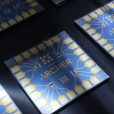Australian semiconductor company Archer Materials (ASX: AXE) has reached a significant milestone in engineering its cutting-edge qubit material, which will likely play a role in future generations of powerful quantum computing.
A qubit is the fundamental unit of information in quantum computing. Archer is one of few companies in the world developing qubit processors, chips, for quantum computing and technology. The company has a patented approach to qubit chip development using a unique carbon nanomaterial. Qubits can be implemented using various quantum systems, however there are only a few available today, and include superconducting circuits that need to be cooled to ultra -low temperatures to operate.
One of the most intriguing aspects of qubits is their ability to exist in a superposition, meaning they can be in a combination of 0 and 1 states at the same time. This property allows quantum computers to perform certain computations much more efficiently than the computers available today. Some of these specific tasks may also include computations related to artificial intelligence and machine learning.
Importantly, qubits are highly sensitive to environmental disturbances, such as heat and magnetic fields – what is referred to as ‘decoherence’, that ultimately leads to errors in quantum computations. Protecting against decoherence is one of the major challenges in developing quantum processing chips.
The breakthrough that has been confirmed by Archer involves the optimisation of its qubit processor materials’ quantum coherence times to exceed 230 nanoseconds at room temperature. This is significant, as it already exceeds the times required to process signals in quantum devices.
Critical to the testing was the qubit material maintaining its intrinsic metallic-like properties during at room temperature, which would allow the material to be integrated into modern electronic circuits. Such quantum coherence times had previously only been achieved for Archer’s qubit material at extremely low temperatures of approximately -173°C.
Other qubit systems and architectures have demonstrated longer coherence times; however each qubit system varies by the requirements of the quantum computing architecture. For Archer, the company claims it is the longest coherence times they’ve seen for any similar nanomaterial at room temperature.
“This achievement is a breakthrough for Archer’s qubit development. Long quantum coherence times are crucial for qubit materials in quantum computing,” said Archer CEO, Dr Mohammad Choucair.
“Archer has now demonstrated a significant advance in its qubit materials’ quantum coherence times observed at room temperature. This extended time window for processing quantum information was only previously possible by cooling the qubit material using liquid nitrogen, to reach nearly -173°C.”
The appeal of Archer’s qubit material has been its potential to facilitate quantum computing at room temperature and easy integration with modern electronic circuits, promising to do away with the complex infrastructure limiting the accessibility to quantum technology.
This would allow for Archer’s future devices to execute sophisticated quantum algorithms to deliver reliable quantum computations.
“Archer is confident that this breakthrough in quantum materials positions it as a leading player in the quantum computing industry, paving the way for the potential development of commercially viable quantum technology solutions,” added Dr Choucair.
Through painstaking testing and production, Archer scientists increased its qubit material room temperature capabilities by over 30%, meaning it can now maintain quantum superposition states for over 30% longer than previously achieved at room temperature.
With its ability to powerfully process vast amounts of data and then quickly and accurately test and model complex systems, quantum computing is likely to enable future generations of artificial intelligence.
The Australian Institute for Machine Learning, based in Adelaide, South Australia, features amongst Archer’s world-class collaborators. Archer also recently became the first ASX-listed company to partner with the World Economic Forum’s Centre for Fourth Industrial Revolution.
Interest in highly powerful computing, including artificial intelligence, from institutional investors contributed to a recent tech rally which saw chipmaker NVIDIA, the world’s largest semiconductor company, reach a USD $1 Trillion valuation. The rally was fuelled by growing awareness of AI and its increasing potential to replace roles performed by humans. The ChatGPT craze is just the tip of the iceberg as AI capabilities advance further and computing processing power increases.
- Harris Technology to expand refurbished tech division amid rising demand from cost-conscious Australians - April 30, 2025
- Harris Technology secures major investment from Taiwan’s FSP Technology at 100% premium - March 10, 2025
- ARC Funds acquires 30% of auzbiz Capital as latest direct-to-investor marketing venture - October 8, 2024













Leave a Comment
You must be logged in to post a comment.